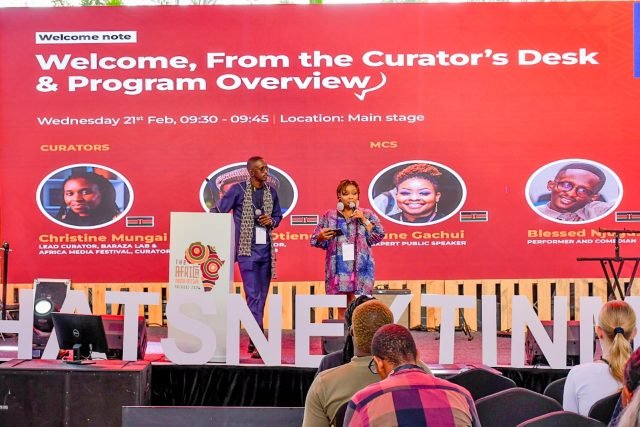Over 700 delegates from across the continent attended the second Africa Media Festival which took place from February 21 to 22nd, 2024 at the National Museum of Kenya.
The delegates were engaged in two days of intensive workshops, discussions, and networking sessions aimed at fostering collaboration and innovation.
During the festival’s keynote address, Onica Makwakwa, Executive Director at Global Inclusion Partnership, emphasized the crucial role of media in shaping narratives, promoting inclusivity, and propelling socio-economic development in Africa.
However, Makwakwa also drew attention to the urgent issue of the digital divide, with over 60% of the continent’s population, equivalent to 1 billion people, still lacking online access. This digital exclusion hampers their ability to access education, employment, and socio-economic opportunities.
Despite efforts to improve internet affordability, many African youth have devoted a significant portion of their income solely to gain connectivity, placing them at a disadvantage in the global job market.
Makwakwa stressed the importance of challenging existing power dynamics and prioritizing local knowledge and solutions in decolonizing innovation within African technology and the need to bridge the digital gap to ensure equitable access to information but also to foster innovation and empower marginalized communities.
Moreover, Makwakwa emphasized the need to challenge existing power dynamics, address biases, and prioritize local knowledge and solutions in decolonizing innovation within African technology by fostering an ecosystem that supports African entrepreneurs, innovators, and technologists in creating contextually relevant solutions to address the unique challenges faced by African communities.

Additionally, the festival highlighted the persistent digital gender gap, particularly evident in rural areas with inadequate internet infrastructure, further marginalizing women. Despite increased access to smartphones and the internet, a widening disparity persists in how men and women utilize this access, underscoring the urgent need for targeted interventions to bridge this gap and ensure equal opportunities for all.
The COVID-19 pandemic exacerbated existing inequalities, especially in Sub-Saharan Africa, where many children faced barriers to online education due to connectivity issues. This underscored the necessity not only to address the digital gender gap but also to tackle broader internet access issues in rural and underserved areas.
To address these challenges, stakeholders emphasized the importance of collective action, including investment in infrastructure development, digital literacy programs targeting women and girls, and policies promoting gender equality in technology access and usage.
Makwakwa urged Africans to lead innovation in the digital sphere and advocated for a shift away from Western-centric perspectives. She also highlighted the need to produce and curate African narratives online to counter the dominance of English-language content.
The festival also addressed concerns about the financial sustainability of media organizations, exacerbated by the impact of COVID-19 and the rise of misinformation. Diversifying revenue streams through initiatives like training and events emerged as critical strategies for newsroom survival.
In grappling with the evolving media landscape, characterized by fragmented digital consumption and the dominance of social media platforms, media organizations must reassert their commitment to journalistic ethics and integrity. Upholding factual accuracy, impartiality, and transparency in reporting remains paramount.
Looking ahead, the integration of AI into newsrooms is inevitable, but ethical considerations must guide its usage to mitigate risks such as biased content. Furthermore, understanding and serving niche digital audiences can foster trust and credibility in media outlets.
As the festival progresses, participants anticipate delving deeper into these critical discussions and exploring innovative solutions to shape the future of African media. Stay tuned for further updates as the Africa Media Festival 2.0 continues to inspire and drive change across the continent’s media landscape.







